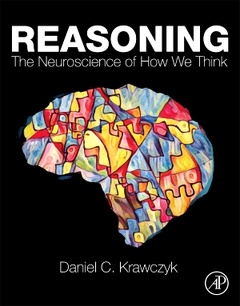Reasoning The Neuroscience of How We Think
Auteur : Krawczyk Daniel

Reasoning: The Neuroscience of How We Think is a comprehensive guide to the core topics related to a thorough understanding of reasoning. It presents the current knowledge of the subject in a unified, complete manner, ranging from animal studies, to applied situations, and is the only book available that presents a sustained focus on the neurobiological processes behind reasoning throughout all chapters, while also synthesizing research from animal behavior, cognitive psychology, development, and philosophy for a truly multidisciplinary approach. The book considers historical perspectives, state-of-the-art research methods, and future directions in emerging technology and cognitive enhancement.
Written by an expert in the field, this book provides a coherent and structured narrative appropriate for students in need of an introduction to the topic of reasoning as well as researchers seeking well-rounded foundational content. It is essential reading for neuroscientists, cognitive scientists, neuropsychologists and others interested in the neural mechanisms behind thinking, reasoning and higher cognition.
1. Introduction to Reasoning 2. Historical Perspectives on Reasoning 3. The Neuroscience of Reasoning 4. The Comparative Approach: Reasoning in Other Species Daniel Krawczyk and Aaron Blaisdell 5. Reasoning Origins: Human Development in Infancy and Childhood 6. Reasoning over the Lifespan 7. Disorders and their Effects on Reasoning 8. Causal Reasoning 9. Deduction and Induction 10. Analogical Reasoning 11. Decision Making and Abductive Reasoning 12. Social Reasoning 13. Future Directions: Emerging Technology and Cognitive Enhancement
advanced students and researchers in neuroscience and neurology of thinking, reasoning, and decision making in basic and applied areas; advanced students and researchers in psychology interested in the neural basis of reasoning and higher cognition
- Provides a comparative perspective considering animal cognition and its relevance to human reasoning
- Includes developmental and lifespan considerations throughout the book
- Discusses technological development and its role in reasoning, both currently and in the future
- Considers perspectives from not only neuroscience, but cognitive psychology, philosophy, development, and animal behavior for a multidisciplinary treatment
- Contains highlight boxes featuring additional details on methods, historical descriptions and experimental tasks
Date de parution : 12-2017
Ouvrage de 352 p.
21.4x27.6 cm
Thèmes de Reasoning :
Mots-clés :
Abductive reasoning; Adolescence; Aging; Alignable differences; Altruism; Analogical mapping; Analogical reasoning; Analogical retrieval; Analogies; Anchoring; Artificial intelligence (AI)Automation; Attention; Availability; Behaviorism; Brainstorming; Causal reasoning; Classical conditioning; Cognition; Cognitive; Competition; Computers; Cooperation; Correlations; Cortex; Cultural differences; Cultural transmission; Decision making; Decision neuroscience; Deduction; Deep learning; Dementia; Deontic reasoning; Development; Developmental stages; Developmental; Dual-systems; Effects; Emotion; Expertise; Field studies; Fluid intelligence; Framing effects; Gestalt; Groups; Guessing; Heuristics; Hormones; Hypothesis testing; Illusion of control; Illusions of will; Imitation; Immersion; Induction; Insight; Learning; Long-term memory; Matching; Maximizing; Memory; Moral reasoning; Networks; Neuroimaging; Neuroscience deduction; Non-alignable differences; Philosophy; Psychology; Reasoning; Reciprocal altruism; Relational reasoning; Relations; Representativeness; Risk; Semantic knowledge; Similarity; Social cognition; Theory of mind; Virtual reality (VR)Working memory



